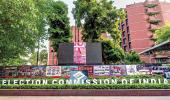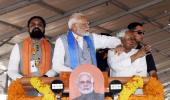'The Election Commission is conducting the National Register of Citizens in Bihar through the backdoor.'

The Election Commission's decision to undertake a 'special intensive revision' of the 2003 electoral rolls in Bihar -- just a few months ahead of the assembly polls -- has raised the Opposition's hackles who allege that it is nothing but the National Registry of Citizens in another form.
The special intensive revision will ensure that no eligible elector is left out of the electoral rolls and no one ineligible is part of it, Chief Election Commissioner Gyanesh Kumar told PTI on Sunday.
Bihar's electorate is 78.9 million voters strong and is spread over 243 constituencies.
The Election Commission has stated that the electoral registration officer in each constituency will be responsible for the special intensive revision exercise.
Why is the Election Commission undertaking a revision of the 2003 electoral rolls in Bihar?
Being a border state, there are apprehension that in the last two decades many illegal settlers from Nepal and Bangladesh have moved into Bihar and become Indian citizens.
The special intensive revision of electoral rolls is expected to remove bogus voters and include all the eligible Indian voters who have been left out, apart from updating incorrect details.
Why is 2003 being used as the cutoff year?
The last intensive revision of Bihar's electoral rolls was done in 2003, with January 1, 2003, being the qualifying date.
So what is the problem with the exercise?
The problem is that voters whose names are not in the 2003 voters list will have to submit an enumeration form with one of 11 documents to prove their citizenship.
What are these 11 documents?
- Any identity card/pension payment order issued to regular employee/pensioner of any central/state government/PSU
- Any identity card/certificate /document issued in India by government/local authorities /banks/post offices/LIC/PSUs prior to 01/07/1987
- Birth certificate issued by the competent authority
- Passport
- Matriculation/educational certificate issued by recognised boards/universities
- Permanent residence certificate issued by competent state authority
- Forest right certificate
- OBC/SC/ST caste certificate
- National Register of Citizens (wherever it exists)
- Family register prepared by state/local authorities
- Any land/house allotment certificate by government.
Interestingly, the Aadhaar card is not among the required documents.
Do all the Bihar voters need to submit these 11 documents?
No. Out of the existing 78.9 million voters in Bihar, 49.6 million voters' names exist in the 2003 voters list. They will not have to submit any fresh documents, but only need to confirm their name and submit an enumeration form to the electoral officer.
However, nearly 30 million voters, roughly 37 percent of the voters in Bihar, will have to submit new documents to prove that they are eligible voters.
So why the apprehension?
According to Ajaz Ashraf, a columnist in the Mumbai newspaper Mid-Day, 'Those not on the 2003 electoral roll will have to submit an enumeration form with documents proving their citizenship. Those born before July 1, 1987, will have to furnish evidence of when and where they were born.
'In addition to this document, those born between July 1, 1987, and December 2, 2004, will have to provide a document certifying the place and date of birth of either of their parents. They will have to do the same for both their parents in case they were born after December 2, 2004.'
In Ajaz Ashraf's words, 'Citizenship on trial is in Bihar.'
According to Asaduddin Owaisi, the All India Majlis-e-Ittehadul Muslimeen leader, 'To be enrolled in the voters list, every citizen will now have to show documents not only proving when and where they were born, but also when and where their parents were born.'
'Even the best estimates state that only three-fourths of births are registered and most government documents are riddled with errors. People in the flood-prone Seemanchal region (Araria, Madhepura, Saharsa, Supaul, Purnea, Kishanganj and Katihar) of Bihar are among the poorest and it is a cruel joke to expect them to possess their parents' documents.'
'The Election Commission,' Owaisi asserts, 'is conducting the National Register of Citizens in Bihar through the backdoor.'
West Bengal Chief Minister Mamata Banerjee too jumped into the fray, stating, 'This move by the Election Commission of India is more dangerous than the NRC.'
What was the controversy over NRC about?
The National Register of Citizens is a nationwide record of Indian citizens who have been able to prove their residency in India prior to a cutoff date.
Fears have been expressed that the NRC will be used to disenfranchise those who lack the documents despite living in India for generations, especially the marginalised communities.
Home Minister Amit Shah memorably said in 2019, 'Aap chronology samajhiye, pehle CAB (Citizenship [Amendment] Bill; later the Citizenship (Amendment) Act) aayega, phir NRC aayega.'
Shah later clarified that the NRC would not implemented, and that is where the matter rests -- until it was revived by the Opposition over Bihar's revision of rolls.
What is CAB?
The Citizenship (Amendment) Bill, later the Citizenship (Amendment) Act, stated that Hindus, Sikh, Christians, Jains, Parsis from Afghanistan, Bangladesh and Pakistan who entered India or before December 31, 2014, will get Indian citizenship. The law does not include Muslims.
In other words, if a Muslim residing in Bihar is unable to prove her/his credentials to the Election Commission, s/he could lose her/his Indian citizenship if and when the NRC is implemented in India.
In the words of Derek O'Brien, the Trinamool Congress member of Parliament, 'Is this the new version of the Nazi ancestor pass (ahnenpass)?'
Ahnenpass in Adolf Hitler's Germany was a process where people recorded their Aryan ancestry. Germans were required to trace their ancestry back at least four generations to avoid being categorised as Jews.
What is the Election Commission saying?
Chief Election Commissioner Gyanesh Kumar has justified the move to conduct a special intensive revision of the electoral rolls in Bihar, saying that it is aimed at removing any 'illegible' voter and ensuring that no genuine Indian citizen is left out of the voters list.
Intensive revisions were carried out in 1952-1956, 1957, 1961, 1965, 1966, 1983-1984, 1987-1989, 1992, 1993, 1995, 2002, 2003 and 2004.
Most of these intensive revisions were carried when the Congress party ruled India.
'Article 326 of the Constitution specifies the eligibility to become an elector. Only Indian citizens, above 18 years and ordinary resident in that constituency, are eligible to be registered as an elector,' Kumar said.
According to the Representation of People Act 1950 and Rule 25 of the Registration of Electoral Rules 1960, Kumar further emphasised the electoral rolls must be revised before every election.
How long will the revision of rolls take?
The exercise begins on July 1 and will end on August 31; in other words it will have to be completed in 62 days.
Is it possible to complete the task in this timeframe?
Rahul Shastri, a researcher from the Bharat Jodo Abhiyan, wrote in The Hindu, 'This is a superhuman task.'
Assuming 47.6 million voters of Bihar's 243 assembly constituencies are asked to submit documents, Shastri explains it translates into 195,000 documents of eligible voters per constituency.
Now each constituency has 1 electoral registration officer, who has to prepare a draft roll of 195,000 voters in 62 days, issue a notice and launch a suo motu inquiry into each elector whose eligibility is in doubt.
Then there are the nearly 30 million voters over 243 constituencies who were not in the 2003 voters list and who would have submitted their eligibility documents, which will need to be verified and decided upon too.
In short, accomplishing this task before August 31, 2025 seems Herculean.










